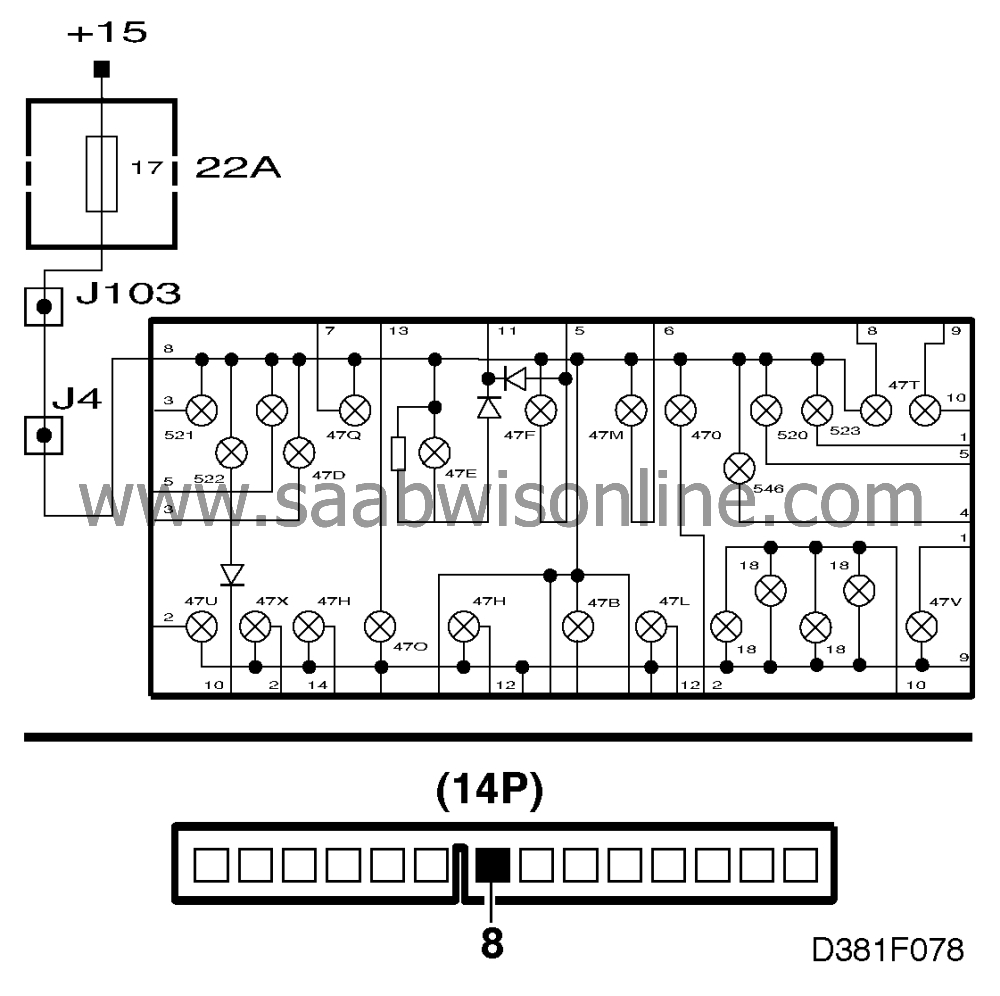Indicator and warning lamps (MIU 1)
|
|
Indicator and warning lamps (MIU 1)
|
|
•
|
SPORT mode indicator lamp, pin 5
(black 12-p).
|
|
•
|
WINTER mode indicator lamp, pin 4 (black 12-p).
|
|
•
|
CHECK ENGINE lamp (MIL), pin 2 (black 12-p).
|
|
•
|
CHECK GEARBOX warning lamp, pin 1 (black 12-p).
|
|
•
|
"Open door" warning lamp, pin 10 (14-p).
|
|
•
|
Oil pressure warning lamp, pin 3 (14-p).
|
|
•
|
Low brake fluid warning lamp, pin 5 (14-p).
|
|
•
|
Handbrake on warning lamp, pin 6 (14-p).
|
|
•
|
ABS (ANTI LOCK) warning lamp, pin 7 (14-p).
|
|
•
|
SRS 2 warning lamp, pin 8 (black 12-p).
|
|
•
|
"Faulty bulb" warning lamp, pin 2 (white 12-p).
|
|
•
|
Low washer fluid warning lamp, pin 5 (white 12-p) (M1994 and later)
The above indicator and warning lamps are supplied with battery voltage from the main
instrument display panel (+15 supply) and grounded in their systems outside the main
instrument display panel.id="xref404">
|
If none of the above lamps work and the engine cannot be started, fuse 17 has
probably blown.
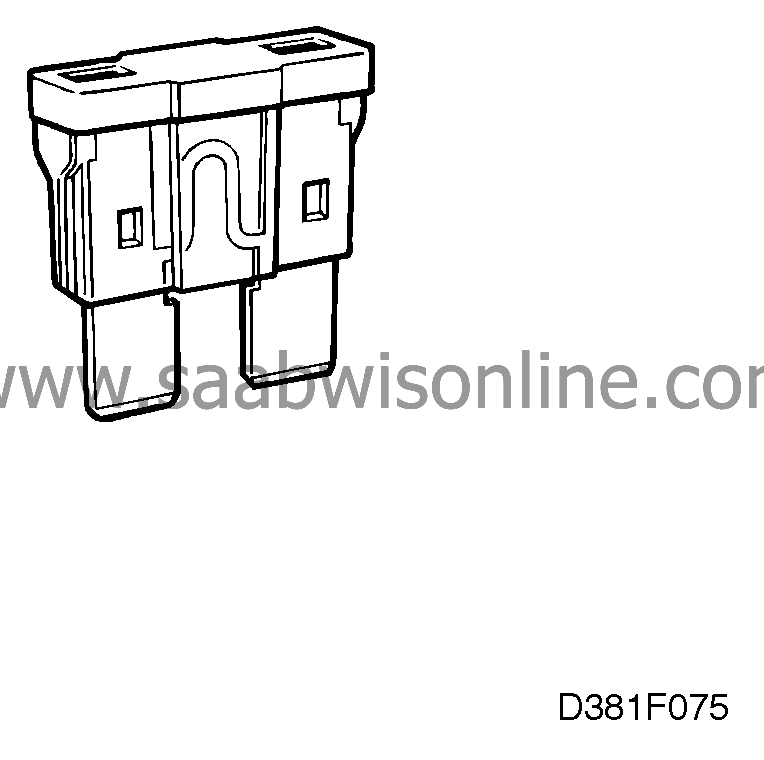
|
1.
|
Check whether fuse 17 is intact
and live.
|
|
2.
|
Check whether battery voltage is present on pin 8 of the main instrument display
panel by taking a reading across pin 8 (14-p) of the connector and a good ground.
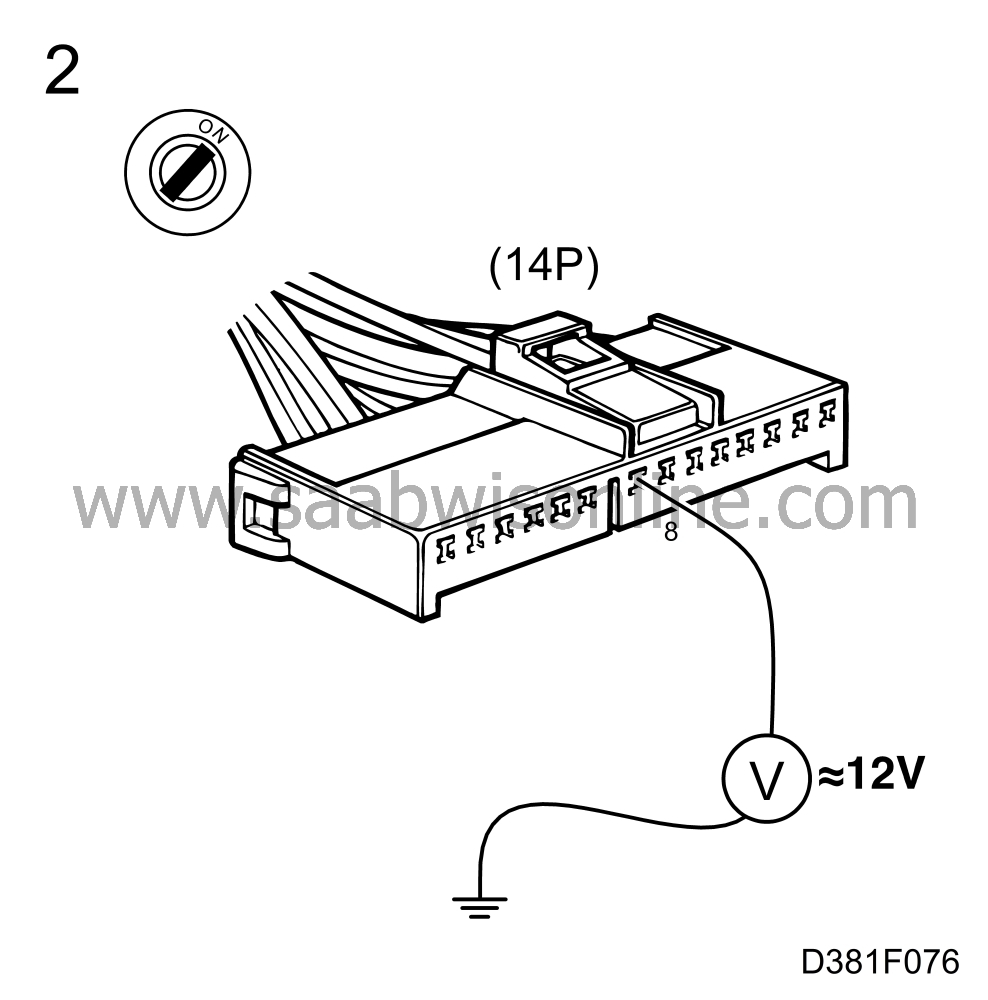
|
|
3.
|
Check the wiring for continuity/shorting by measuring the resistance across
the output side of the fuse and pin 8 of the main instrument display panel
connector.

|
Indicator or warning lamp fails to light up when activated.

|
1.
|
If the indicator or warning lamp
fails to light up when it should, the bulb is probably faulty and must be changed. If the lamp
still fails to light up when activated, check that the new bulb is OK by fitting it in place of
another bulb in the main instrument display panel that does light up.
|
|
2.
|
Check the conductive foil on the rear of the main instrument display panel for an
open circuit between the bulb's ground connection and the foil's corresponding
connection to the connector.
|
|
3.
|
If there is an open circuit in the conductive foil, change the foil.
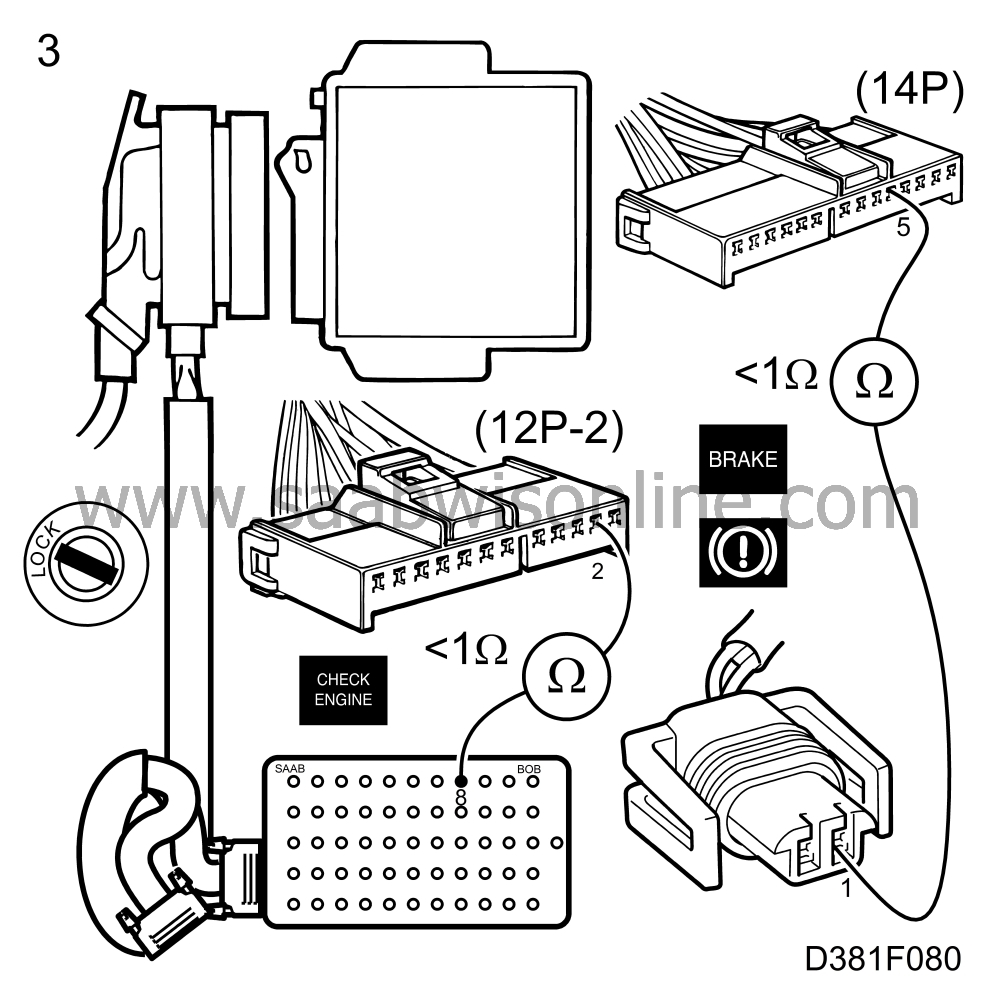
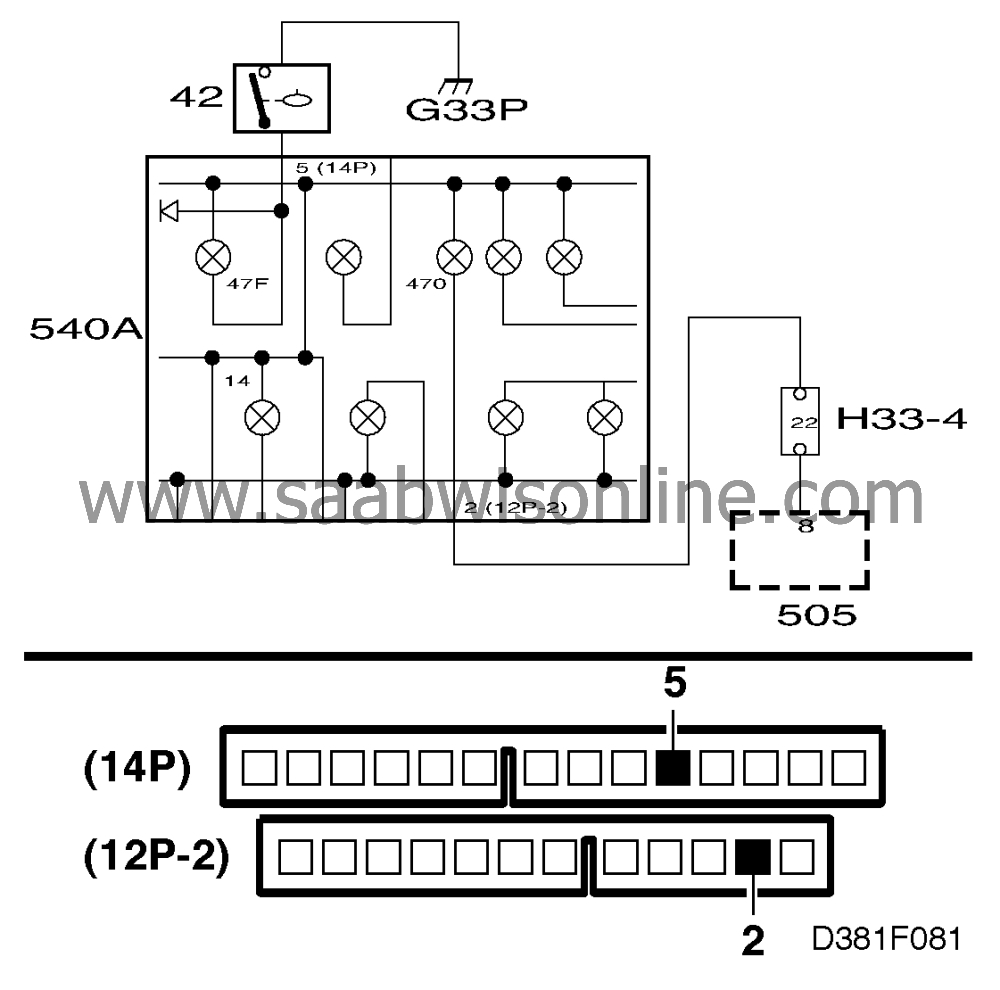
If the conductive foil is intact, there is probably an open circuit in the wiring to the
lamp's sensor. Check the wiring for an open circuit between the main instrument
display panel and the bulb's sensor by measuring the resistance.
|
Lamp
|
Main instrument display
panel pin
|
Sensor
pin
|
SPORT
|
5 (12p-2)
|
24
|
WINTER
|
4 (12p-2)
|
7
|
CHECK ENGINE (MIL)
|
2 (12p-2)
|
8 (M2.10.2) 32 (TRIONIC)
|
CHECK GEARBOX
|
1 (12p-2)
|
6
|
"Door open"
|
10 (14p)
|
31
|
Oil pressure
|
3 (14p)
|
1
|
Brake fluid
|
5 (14p)
|
1
|
Handbrake
|
6 (14p)
|
1
|
ABS (ANTI LOCK)
|
7 (14p)
|
1
|
SRS 1
|
8 (12p-2)
|
1
|
"Faulty bulb"
|
3 (12p-1)
|
12
|
Washer fluid
|
5 (12p-1)
|
13
|
|
•
|
Main beam indicator lamp, pin 13
(14-p).
|
|
•
|
Lights on indicator lamp, pin 1 (white 12-p).
|
|
•
|
Rear fog light indicator lamp, pin 12 (14-p).
|
|
•
|
LH direction indicator repeater lamp, pin 14 (14-p).
|
|
•
|
RH direction indicator repeater lamp, pin 2 (14-p).
|
|
•
|
CRUISE indicator lamp, pin 2 (white 12-p)
|
|
•
|
EXH indicator lamp, pin 12 (black 12-p)
The above indicator and repeater lamps are grounded in the main instrument display
panel and supplied with battery voltage from their systems outside the main instrument display
panel.id="xref410">
|
Indicator lamp does not light up when activated.
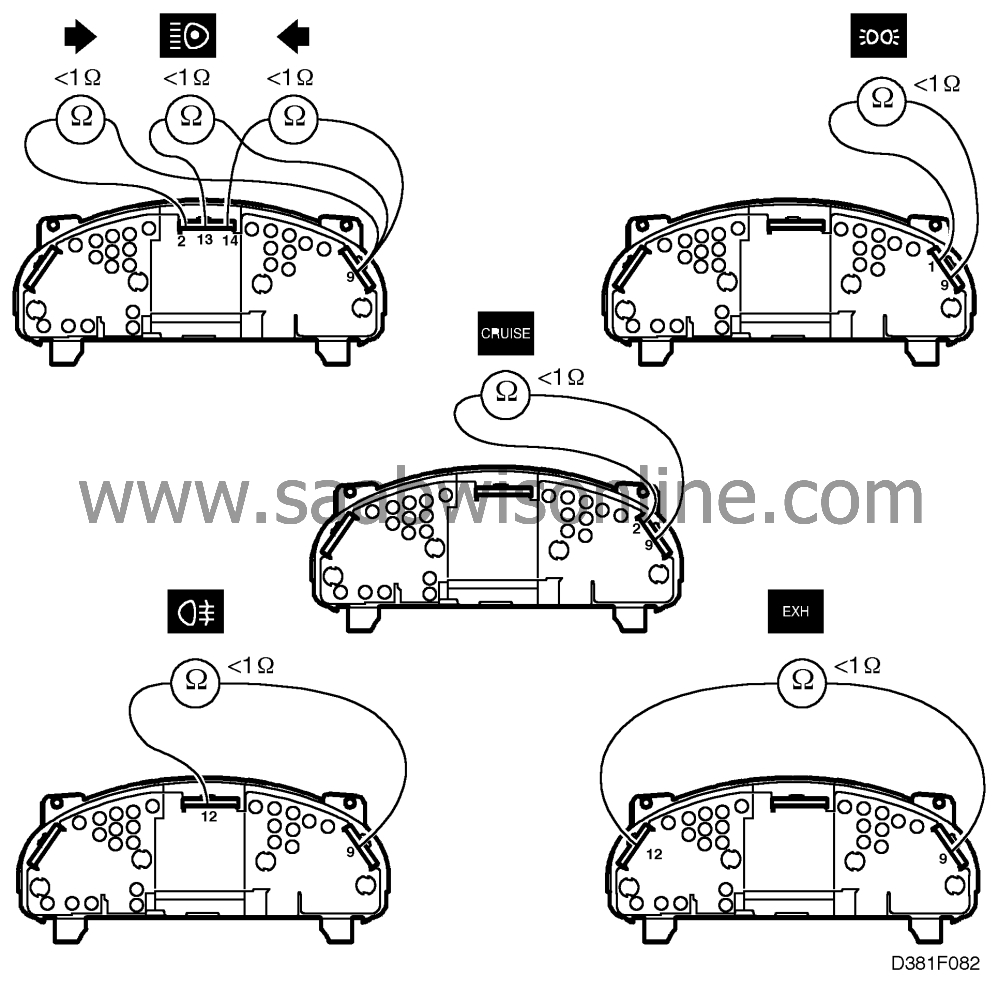
|
1.
|
If the indicator lamp does not
light up when it should, start by checking whether the lamp's fuse is intact. If the fuse is
intact, the bulb is probably faulty and will have to be changed. If the lamp still fails to light up
when activated, check that the new bulb is OK by fitting it in place of another bulb in the main
instrument display panel that does light up.
|
|
2.
|
Check the conductive foil on the rear of the main instrument display panel for an
open circuit between the bulb's pin in the connector and the foil's corresponding
connector.
If there is an open circuit in the conductive foil, change the foil.
If the conductive foil is intact, there is probably an open circuit in the wiring to the
lamp's sensor. Continue with point 3.
|
|
3.
|
Check the wiring's ground connection by taking a voltage reading between
BATT negative and pin 9 of the connector (white 12-p). The reading obtained should be <
0.5 V.
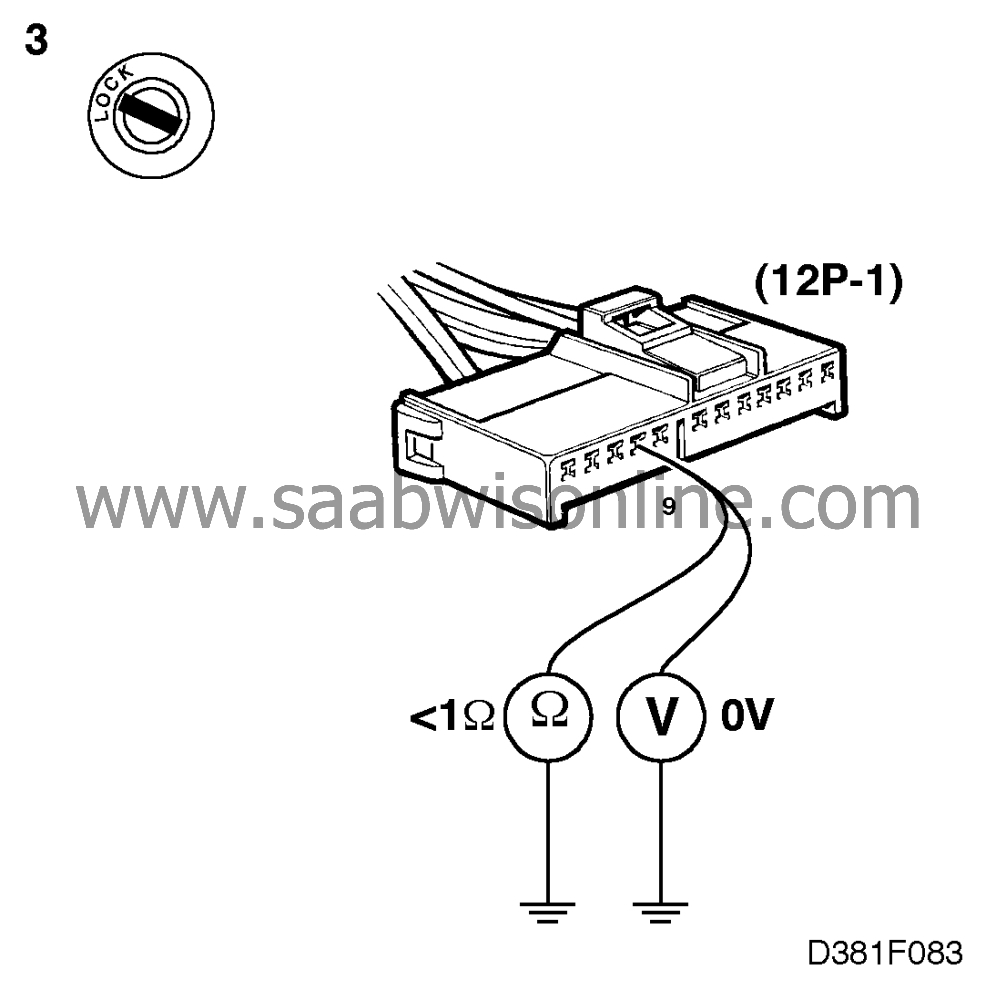
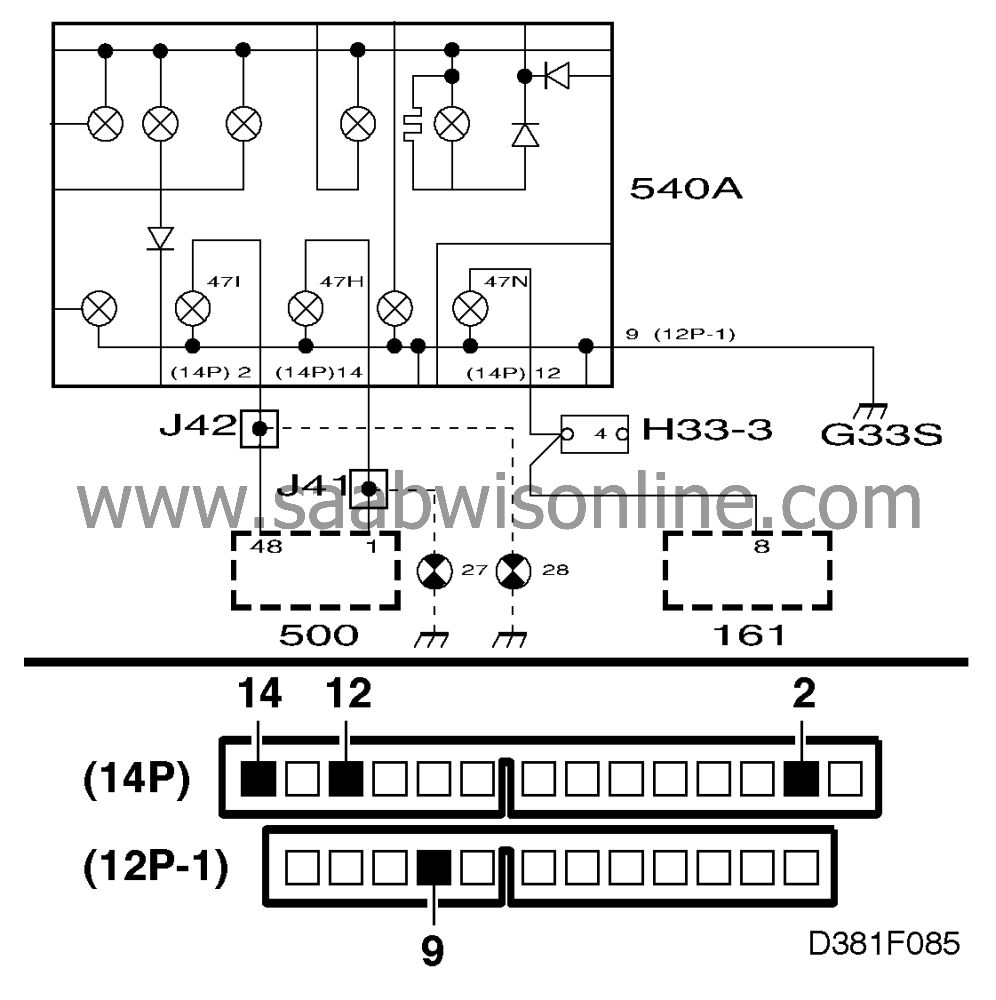
|
|
4.
|
Check the wiring for an open circuit between the main instrument display panel
and the bulb's sensor by measuring the resistance.

|
Lamp
|
Main instrument display
panel pin
|
Sensor
pin
|
Main beam
|
13 (14p)
|
8
|
Lights on
|
1 (12p-1)
|
6
|
Rear fog light
|
12 (14p)
|
8
|
RH direction indicator
|
14 (14p)
|
1
|
LH direction indicator
|
2 (14p)
|
48
|
CRUISE
|
2 (12p-1)
|
8
|
EXH
|
12 (12p-2)
|
2
|









